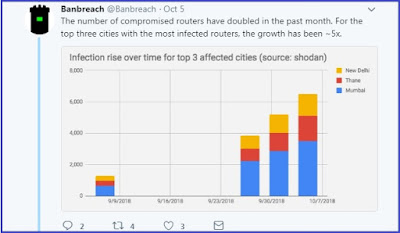- More than 30,000 routers in India are identified of crypto-jacking malwares.
- Hackers secretly hijacked 200,000 routers in Brazil in last quarter.
- Users help mining cryptocurrencies for hackers when they visit websites via the infected routers.
Crypto-jacking plauge spreads exponentially and has attracted wide range of attackers across the globe. A recent study portrays that crypto-jacking has grown three folds in the last two quarters by targeting government websites and online advertisements. Unlike ransomware attack, crypto-jacker makes profit using victim's computing resources being unnoticed.
Related Article: Cryptojacking Craze: Targeting Government Websites
CoinHive - Crypto-jackers favorite tool
CoinHive is a piece of code which enables the browsers to mine cryptocurrencies. It primarily focuses on mining Monero. Though the original intention of CoinHive is not to work on stealth mode but the hackers are using it as a powerful weapon to mine crytpocurrencies without the knowledge of victims. Attackers are constantly working towards intersifying the crypto-jacking practices by spreading modern versions of the malware.
McAfee labs reported that more than two and a half million versions of crypto-jacking malware has been issued in last quarter. Most of them are related to CoinHive tool.
Related Article: Malvertising - YouTube ads used for cryptojacking
Related Article: Malvertising - YouTube ads used for cryptojacking
Crypto-jackers targeting Routers
Black-Hat hackers are have already made 280,000 MicroTik routers to mine Monero continuously in Latin America region. Attackers targeting routers is more worrying for web users as it becomes hard to detect and report such illegal activities. |
| Banbreach Internet Security unit |
Monero Community on Crypto-jacking
Monero community has recently announced that they have created the Monero Malware WorkGroup to stop the spread of crypto-jacking practices. The workgroup will focus on providing tools and assistance towards securing themselves from the hackers. The community has also strongly condemned the usage of Monero in such illegitimate activities.
Earlier this year, Japanese cryptocurrency regulators were pushing the crypt-exchanges to stop supporting Monero in their platforms. The regulators cited that the anonymous capabilities of XMR (Monero) cryptocurrency might help in money laundering and illicit finances.